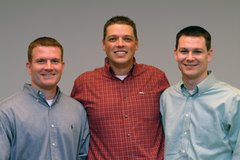Perhaps the most profitable way to use this post is to read the next paragraph, then scroll down until something of interest catches your eye and just read that part(s).
I've just returned from a systematic theology primer over dinner with Bruce Ware. Thank you to those who submitted questions for me to ask (even those who didn't do so through this blog). If my memory serves me correctly, I was able to ask each of them. Instead of listing his responses to my few questions, I'll try to recount a synopsis of the entire talk. (I invited two good friends who are TBI students along for the discussion as well. They had plenty of questions too.)
- The evening began with a radically God-centered worship experience at Bethlehem's Saturday Evening Service. The music, the Lord's Supper, and the message (Isa. 40:12-17!) each revolved around the exalted God of the Bible. Very nourishing feast for the soul! (To hear the message, click my link, then click "Listen to this sermon series-scroll down to Ware's message-should be available around 6/7).
- Dr. Ware apparently didn't finish his sermon in the pulpit because it continued until we arrived at Chipotle. Ware was reveling in God's Self-sufficiency (You simply must read Tozer's chapter). He described this great truth about God as the ultimate blow to the pride of man. (By the way, we encouraged the post-sermon sermon). Ware mentioned that while on an overseas stint during his undergrad days his reading the Bible about five hours each day and reading Tozer was among the most helpful tools in shaping his trajectory of Theology. I concur with the Tozer part, and wish I could concur with the extended season of reading God's Word five hours per day part. Lord, let it be!
- At the restaruant, we discussed Ware's view of the atonement. He holds an infralapsarian, non-double-predestination, non-limited atonement, four-point calvinistic (minus the "L"), Christ died for all people in all places in the same way view. Ware has contributed a chapter to a book on Five Views of Election in which he defends the infralapsarian view. He's not sure when the book is to be released. What a dinner discussion!
The Infralapsarian View
The infralapsarian view contemplates the salvation of men after the Fall. Those who are chosen to salvation were chosen on the basis of being members of a fallen race which means that all who shall come to faith were elected subsequent to the Fall. According to the Infralapsarian View, the order of events would be as follows.
- God decreed to create man in the image of God.
- God decreed to permit the Fall of mankind in Adam.
- After the Fall, God decreed to elect some of the fallen souls to salvation and to leave others in a natural state of condemnation.
- God decreed to provide a Redeemer for the elect whose work of redemption would be sufficient for all.
- God decreed to secure the application of this salvation to the elect by means of the Holy Spirit.
Concerning the order of the divine decrees before creation infralapsarianism is the belief that God decreed to redeem mankind after God decreed the fall of mankind. Thus the fall brought about a proliferation of human life on the earth, all those whom God had not elected.
The term "supralapsarian" indicates that the decree of election to salvation took place before God created man and before He permitted the Fall. According to the Supralapsarian View, the objects of the Divine decree were contemplated merely as men whom God would create, all of whom were on an equal basis in His sight. According to the Supralapsarian View, the order of effects would be as follows.
- In eternity past God proposed to elect some of mankind to eternal life and to condemn others.
- God proposed to create man.
- God proposed to permit the Fall.
- God proposed to send Christ to redeem the elect.
- God proposed to send the Holy Spirit to apply salvation to the elect
With reference to the pre-creation decrees of God,supralapsarianism is the belief that God's decree of election came before He decreed the fall. Thus, God chose people for [heaven] and hell free from any influence of what man might do.
- Then we asked Ware to discuss his view of Christ's Kenosis Experience.
Kenosis - "emptying". Reference to the self-emptying of Christ per Philippians 2:4-11.
- Ware believes that Christ emptied Himself, but didn't empty anything of Himself. He described the kenosis experience as "subtraction by addition" based on Paul's use of "taking on" in Philippians 2:7. He likened the incarnation to taking a new showroom car down a muddy road, driving like a drunk teenage boy (my analogy), and returning it to the showroom floor. Then, saying to the salesman, "The same car - in all of its luster and glory - is still there, but it is veiled." Ware said the analogy is comparable to Christ's glory being veiled by His being "poured" (His way of translating the root of ekenosin) into a human being. Therefore, said Ware, Christ took on all the limitations of a man, but did not give up any of His Person. Christ poured Himself into a human's body, with human limitations - yet retained all aspects of His deity. Luke 2:40-52 was central to this discussion.
- We asked about Ware's take on the current position of the International Mission Board (IMB) of the Southern Baptist Convention (SBC) to (1) refrain from appointing missionaries who practice a private prayer language, and (2) do not have an authorized baptism.
This Christianity Today article summarizes the IMB's position. Here's a couple of quotes:
Trustees for the Southern Baptist Convention's (SBC) International Mission Board (IMB) have voted to bar new missionary candidates who practice a "private prayer language" from serving on the mission field.
The trustees voted 50-15 for the new guidelines on November 15, during their meeting in Huntsville, Alabama. The move will not affect current IMB staff or missionaries. Worldwide, 5,122 IMB missionaries work among 1,194 people groups.
During the November meeting, trustees also voted to accept only those missionary candidates baptized in churches that teach believer security and that practice only baptism by immersion.
- We asked about Ware's devotional life. He spoke with worshipful enthusiasm about his joy of listen to Max McLean's ESV audio while he follows along in the text. Ware expressed a freedom that comes from not having to focus on the reading, but immersing himself in the situation of the text, and enjoy its meaning. He is currently somewhere in Judges.
- Ware asked questions to me about church planting in the SBC, and made several insightful comments about the rise of emphasis on cultural accomodation that is unintentionally hindering the advance of the gospel. I tend to agree.
- I gave Ware a copy of "my" book Because We Love Him: Embracing a Life of Holiness, to which Ware replied, "Aw Shucks." Seriously.








No comments:
Post a Comment